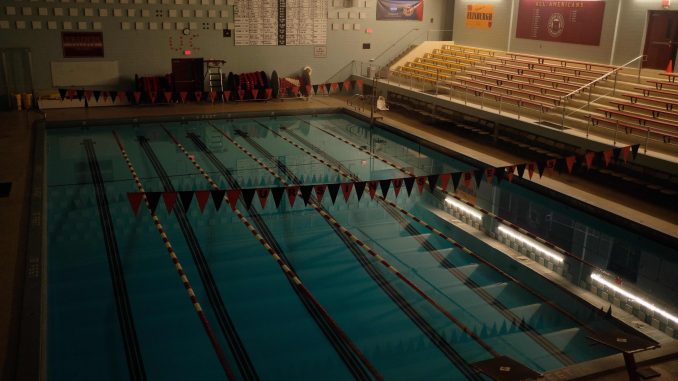
Kevin Leon
keleon@ursinus.edu
On Friday November 22, Ursinus President Brock Blomberg announced via email that the 2019-2020 season for both Men’s and Women’s swimming had been cancelled as a result of an investigation into hazing allegations. An official statement regarding the incident sits on both the men’s and women’s swimming teams’ webpages.
This decision, along with other sanctions, was the result of an investigation that began in September. It has caused frustration for some members of the teams.
In addition to the cancellation of the teams’ seasons, the sanctions include changes to the current and future living arrangements of team members. The teams will not be allowed to have more than three members living together through 2022, according to some swimmers. Several team members are also prohibited from hosting or participating in team-wide social gatherings. Some students noted that they lost their leadership positions and jobs on campus as part of their consequences. The swimming coach, Mark Feinberg, though not involved with the hazing incident, assumes a share of responsibility for the teams’ actions and has been placed on probation. Feinberg plans on addressing the teams’ culture going forward.
“The college began a thorough investigation into allegations of hazing on campus by members of our men’s and women’s swimming teams. This particular incident involved alcohol and underage drinking,” wrote Blomberg.
The investigators concluded that members of the swimming programs violated the college’s anti-hazing policies written out in the Student Handbook and the college’s Student Code of Conduct. The specifics of the incident have not been made public.
“The process is still going on. It would not be appropriate to disclose any of the details,” said Dean Missy Bryant.
Bryant clarified that the case is considered ongoing due to the fact that members of the swim team have the option to appeal their punishments.
When asked why the investigation concluded with these particular sanctions, Bryant said the administration got here “after a thorough and lengthy investigation,” that the team was sanctioned “based on the severity” of the infractions, and that the punishment was “in line with precedent set by previous, similar cases.”
Members of the men’s swimming team expressed concerns with the way the investigation and case were handled.
“I wouldn’t say that the process was fair. From my perspective it felt like we were guilty until proven innocent,” said sophomore Matt Snyder.
Snyder also thought it was unfair to punish the entirety of the teams.
“The punishment is unfair to a majority of the team,” Snyder said, observing that some of the students who are being punished were “victims of the ‘hazing,’ if that’s what you want to refer to it as. They’re being further punished by not being able to swim,” said Snyder.
Senior Casey Lear expressed frustration about people who weren’t present during the incident in question being punished.
As for their ability to appeal the case, both Snyder and Lear expressed confusion and doubt about whether pursuing that option would change the outcomes.
“We don’t think appealing is going to change much. If we get lucky, maybe the housing sanction will get lifted before 2022,” said Snyder. The results of this case have sent a shockwave through the athletics department.
“It’s had a big impact on the team and athletics. I know other coaches have told their teams to be careful,” said Snyder.
The swimmers said that other athletes were warned that parties with drinking-culture related themes or parties with underage drinking could be interpreted as hazing.
“While the sanctions are harsh, I hope to learn from this as a team. We want to reflect on it. We want to grow. We want to be the leeway into a new anti-hazing community at this school. We hope the sanctions don’t make people angry. We want to turn it into a positive outlook,” concluded Lear.
